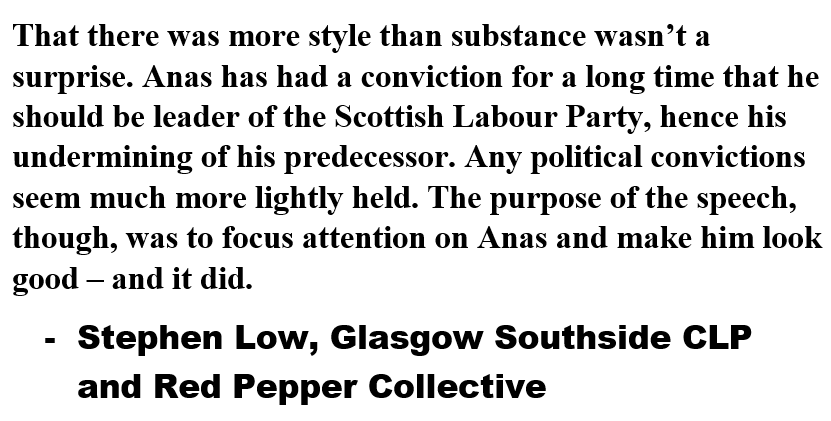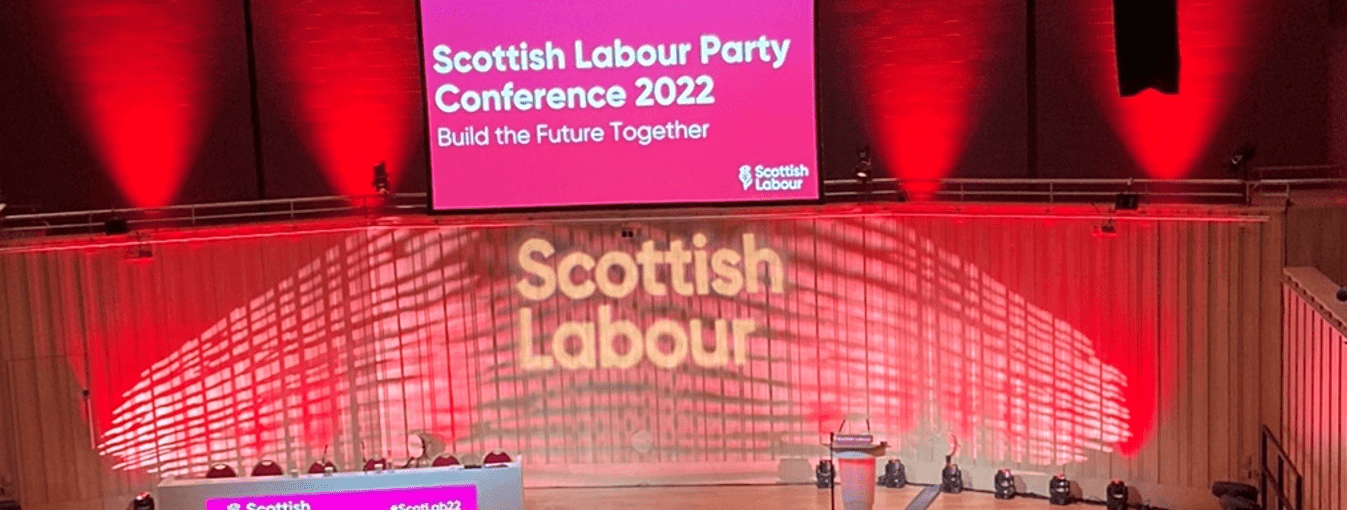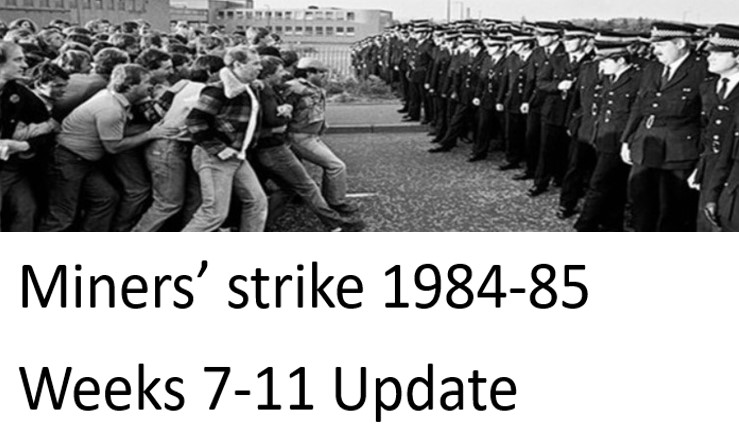By Gray Allan, Falkirk West Labour member
The Scottish Labour Party conference was held last month. Members and trade union delegates gathered in Glasgow on a cold bright spring morning for the opening session of the first person-to-person conference since the pandemic.
The venue was one of the smaller halls in the Royal Glasgow Concert Hall and the low tur- out justified that decision, whether due to fear of COVID or to the political climate in the Party is open to question.
The Campaign for Socialism (CfS), Momentum’s sister organisation in Scotland, chose not to book a stall at Conference, due to the “political climate”. In Scotland, that climate includes not only the UK-wide assault on the left inside the party, but also the continuing dominance of Scottish Nationalism and low expectations for the council elections in May.
Outside the Concert Hall the People’s Assembly against Austerity held a reasonably well attended rally, which many of the delegates attended during the lunch break.
Conference got off to a very slow start. The leader of the Glasgow City Council Labour Group, the unfortunately-named Councillor Malcolm Cunning, gave the usual civic welcome and slammed the SNP, Tories and Greens, without giving any concrete alternative. More of the same was delivered by James Kelly, former MSP and now General Secretary of the Scottish Labour Party. Kelly at least pointed to the soaring energy prices and the billions in profits being made by the energy companies.
Trade Union speakers bring the Conference to life
Delegates livened up when the first trade union speakers got to the rostrum. Billy Stewart of UNISON told delegates that workers had to pay for the banking crisis. Now, while a handful of Russian oligarchs were losing their yachts, the whole working class was going to be hammered by the cost of living crisis. To cheers he told the Conference that “not all oligarchs are Russians, by the way”

Matt Kerr, of the CWU, reminded delegates that the cost of living crisis was nothing new. “The whole rotten system” he said, “is riddled with gross inequality”. In the early years of the twentieth century, Keir Hardie had pointed to the two great evils of the day, landlordism and the cost of living. The problem is the same then and now – the problem is capitalism. He stepped down to loud applause.
Heather Hughes, of Edinburgh North and Leith CLP, gave some concrete examples. In Muirhouse and Pennywell in North Edinburgh, one in three children live in poverty, despite both parents working. At Craigroyston Community High School in Pilton, a hundred kids wait at the school kitchen at the end of every school day to collect left-overs to take home to their families.
Pat Rafferty of Unite, and current President of the STUC, spelled out why working class people need the Scottish Labour Party. Because we have been here before with the financial crisis, the pandemic, the energy crisis and now the cost of living crisis. The STUC looks to Labour to support the legitimate pay demands of working people. “We need an economy that is greener and politicians who are more red”.
Ian Murray MP celebrates the record of the Blair Government
The odious Ian Murray, Edinburgh South MP, Shadow Secretary of State for Scotland, and failed chicken-coup plotter, gave an SNP-bashing speech, which was lapped up by delegates desperate for an election victory. “The SNP have failed to answer any question about independence”, boomed Murray. “Eighty years since they were founded and they still don’t have a clue! For example, Ian Blackford SNP, leader in the Commons, has it that an independent Scotland would not have to pay existing state pensions – Westminster would! Chancers”.
But he went on to slate the 2019 election campaign and called on members to celebrate the record of the last Labour Government instead of trashing it. This from a man who briefed incessantly against Richard Leonard, the former Scottish Party Leader, who was widely seen as being close to Jeremy Corbyn
Anas Sarwar’s speech to conference was his first as leader and it did what it intended to do. It was a well-polished performance, designed to spotlight Sarwar and it did contain a fair amount of meaningless waffle, such as “we reject the old politics – we choose the politics of the future”. Sarwar is good on racism and discrimination, however, because it is his lived experience, having witnessed the death threats made to his parents and it destroys the myth that Scotland has no race problem.

As Stephen Low of the Red Paper Collective pointed out, Sarwar’s speech did contain some positive proposals, such as making software development a compulsory school subject, providing new rights for anyone making a complaint about medical treatment and for free at point of need provision of residential care.
Starmer’s lacklustre performance
Keir Starmer, speaking on the Saturday could not have been more different. He was lacklustre, and free of content and emotion. But what he did say was disturbing. “Labour is the Party of NATO, we created it and we will rebuild our defences”.
Then he turned to domestic affairs; “we want a new Britain” he declared. Echoes of Blair? “We want a new contract with the people of the UK – Security, Prosperity, and Respect”. He barely stopped short of adding we needed a New Labour Party to deliver it. His nod to Scotland was to admit that Scotland had to return far more Labour MPs if Labour wants to win the next UK General Election.
If he is serious on that point, his leadership will have to say something more profound on the constitutional question, other than parroting that ‘now is not the time for a second divisive referendum’. Tory keyboard campaigners, trawling through the social media accounts of Labour candidates in the upcoming council elections, identified some twenty candidates, mainly young members, who had in the past posted either support for Scottish independence or support for a second independence referendum.
So the line of battle is being drawn – which Party is the strongest supporter of the Union? How can Unionist credentials be proven? And the leadership of the Scottish Labour Party think they have the answer to that question!
In a particularly disgraceful decisions, Henry Dunbar, former head of the Orange Order, has been selected to stand for the Airdrie North ward of North Lanarkshire Council, which is a very divisive decision leaving many Catholic party members in Airdrie North reluctant to vote for such a candidate. Had he been a long-standing member of the Labour Party, a Party activist and community campaigner, the decision could at least have been understood. But Dunbar is not a long standing member. The Scottish Executive, probably with the knowledge of the leadership, would have had to give dispensation to allow Dunbar onto the panel of candidates.
Right Wing blows the sectarian dog whistle
So it looks like Sarwar’s (or more likely Jackie Baillie’s) answer to the SNP is to blow the sectarian dog-whistle and look to Protestant working class votes, and Tory acquiescence, to carry the day. Fortunately, cases such as Dunbar’s are a minority. Many young and not so young candidates, a fair few of whom re-joined the Party under Corbyn, are burning to fight austerity and the Tory cuts to public services, passed down to local councils in spades by the SNP Scottish Government.
As such, they have a reasonable policy programme voted through by the conference on which to work. Indeed, as it was at the national Labour conference in Brighton, the contradiction between the right wing leadership and the resolutions adopted by conference is marked. A lot of the decisions are quite radical; that the Preston Model of community wealth building is to be the policy of all Labour Groups on Councils in Scotland, that any future Indyref2 must have a third question on the ballot paper on the extension of powers devolved to Scotland but stopping short of independence, and UNISON’s call for a National Care Service run on a not-for-profit basis.
None of these motions were opposed by the Executive. They were all allowed on to the agenda and they were all passed unanimously. The intention could well have been to demonstrate unity in support of Anas Sarwar, who now includes the word comrade in his vocabulary!
The resolutions passed are an indication of the pressure that will come on the leadership from the rank and file, particularly in the trade unions, as living standards continue to be squeezed. The fact remains that the Scottish party now has good policies on housing, transport and the NCS to campaign on. But it remains to be seen how committed the leadership is to the policy platform agreed by delegates.
With polling day on May 5, we will soon see whether this cuts through to the workers or whether the question of independence continues to dominate Scottish politics.



